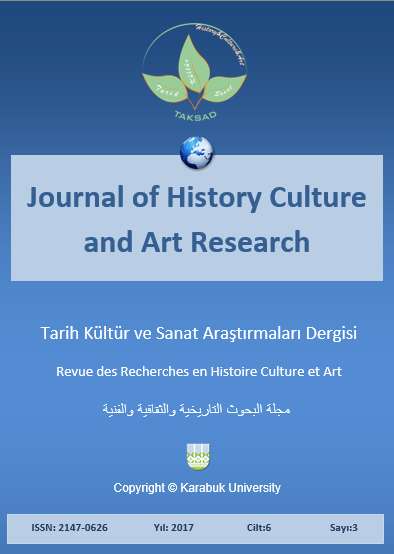Social Upbringing and Morality Based on Gnostic Teachings in Sa’eb’s Poems
DOI:
https://doi.org/10.7596/taksad.v6i3.999Keywords:
Gnosticism, Sa’eb, Upbringing, Social rearing, Humanism.Abstract
Humans’ social rearing within the context of the communities as highlighted in the Persian Gnosticism is closely connected to lenience, tolerance, and laxity, patience and forbearance, affection and anger avoidance. It is a fairly extended discussion which has drawn the attention in Persian literature and many of well-known poets have dealt with making statements in this regard with optimum use of terseness, aestheticism, and coherence. Sa'eb is among the poets who, based on mankind’s value, importance and veneration, have dealt with the survey of one of the most fundamental humans’ needs to wit the way humans are reared socially and he is well aware that real tranquility in a social level depends on guarding such values and moral behaviors as affection, altruism, forbearance etc. These are the topics most abundantly mentioned in Gnosticism. In Gnostic terms, upbringing is an introduction to reaching to cognizance and Sa’eb has well-discerned this very issue.
References
Al-Ansari, Abdulrahman (2000). The love is the astrolabe of the God’s secrets. Tehran: Tahuri.
Amini, Muhammad Sadeq (2008). Islamic Morality and Citizenship Behavior. Tehran: Roshd.
Babazadeh, Ali Akbar (1995) The rituals of friendship in Islam. Tehran: Badr.
Bagheri, Khosro (2005). Another look at the Islamic Rearing. Tehran: Madreseh.
Bulton, Robert (2002). The psychology of the human relationships and people’s skills. Muhammad Reza Bahrami, Tehran: Roshd.
Danesh, Hussein (2001). Spiritual psychology. Tehran: Nasl-e-Now Andish.
Daryagasht, Muhammad Rasool (1992). Sa’eb and Hindi Style in the realm of literary research. Tehran: Ghatreh.
Dashti, Muhammad Ali (1985). A look at Sa'eb. Tehran: Asatir.
Delshad, Behnam (2004). Sociology of Religion. Tehran: Mowla.
Fallahipur, Kiomars (n.d.). Sympathy and cooperation. Journal of Ta’avon, no.25.
Fana’ee, Muhammad (2013). The theory of perfect human in Islamic Gnosticism. Monthly scientific and promotional journal of Cognizance, no.193.
Fathi, Kurosh (2009). Identification of the citizenship upbringing Pathologies. Seasonal journal of citizenship innovations, no.17.
Ferry, Michael (2003). Recognizing group-therapy. Mas’oud Mohammadi, Tehran: Roshd.
Ghorayshi, Zahra Sadat (1983). Children psychology in the society. Tehran: Amir Kabir.
Golchin Ma’ani, Ahmad (1994). The dictionary of Sa’eb’s poems. Tehran: Amir Kabir.
Homa’ee, Jalal Al-Ddin (2006). Mowlavi Nameh. Tehran: 3rd ed., Homa.
Ibn Arabi, Mohy al-Din (n.d.). Al-Fotuhat Al-Makkiyyeh. Beirut: Dar Al-Sadr.
Ibn Manzur, Muhammad Ben Mokrem (1984). Lisan Al-Arab. Qom: Adab Al-Howzeh.
Ibn Moskaviyyeh, Abu Ali Ahmad (1989). Tahzib Al-Akhlagh. Qom: Bidar.
Jorjani, Mir Sayyed Sharif (1981). Al-Ta’arifat. Omran Alizadeh, Tehran: Wafa.
Kadivar, Muhsen (2008). People’s rights in Islam. Tehran: Kavir.
Kamkari, Kambiz (2009). Psychology of Love. Tehran: Bal.
Kashani, Ezzuddin Mahmud. (1946). Mesbah al-Hedaya and Meftahat al-Kenaya. Jalal al-Din Homa’ee, Tehran: Sana’ee.
Khalili, Muhammad Hussein (2003). Principles of the philosophy of love from the viewpoint of Avecina and Mollasadra. Qom: Boostan-e-Ketab.
Kherghani, Abulhassan (2006) Compositions of Abulhassan Kherghani. revised by Javad Nurbakhsh, London: Ne’ematullahi cloister.
Khorramshahi, Baha'a al-Din (1998). Holy Quran and Quran Research license. Tehran: Nahid.
Khosropanah, Abdulhussein (2010). What is anthropology. Seasonal Journal of Religious Anthropology, no. 24.
Kolayni, Muhammad Ya’aghub (1996). Osul-e-Kafi. Javad Mustafa, Tehran: Golgasht.
Lahiji, Shamsuddin Muhammad (1993). An explication of Golshan-e-Raz, introduction and odes, Muhammad Reza Barzegar Khaleghi, Tehran: Zavvar.
Leo, Buscalia (2001). The art of being a perfect Human. Zohreh Fotuhi, Tehran: Dayereh.
Mahdavi Kani, Muhammad Reza (2008). The turning point in the practical ethics. Tehran: Islamic Culture.
Mehrmohammadi, Mahmoud (1998). Education and civil society. The Journal of Educational Studies, no.3&4.
Mojtabavi, Sayyed Jalal al-Din (1987). The science of Islamic Ethics. Jame’e al-Adat Naraghi, Tehran: Hekmat.
Muhammadi, Muhammad Hussein (1996). The lanterns of imagination. Tehran: Jami.
Nasr, Sayyed Hassan (1983). Mystics teachings from yesterday to today. Tehran: Ghasideh Sora.
Nikzad, Mahmoud (2006). Techniques of guidance and principles of counseling and education. Tehran: Kayhan.
Rajabi, Mahmud (2000). Anthropology. Qom: Imam Khomeini Institution.
Sa’eb, Muhammad Ali (1995). Poetical works of Sa’eb Tabrizi. Introduction: Amiri Firuzkuhi, Tehran: Khayyam.
Sajjadi, Sayyed Zia’a al-Din (2009). An introduction to the gnostic and mystic principles. Tehran: Samt.
Shamshiri, Babak (2006). Offering a subjective pattern for the purpose of navigating and organizing educational affairs. Journal of Humanities. Shiraz University, no.4.
Sommers Felnagen, John (2005). Psychotherapy Interviews. Tehran: Roshd.
Tabibian, Sayyed Hamid (2008). Arabic-Persian Larousse Dictionary. Tehran: Amir Kabir.
Tamimi, Abdulwahed Ben Muhammad (1994). Gherar Al-Hikam wa Dorar Al-Kalem. revised by Jalal al-Din Hosseini Armavi, Tehran: Tehran University.
Tusi, Nasir Al-Ddin (1994). Akhlagh-e-Naseri. Revised by Mojtaba Minavi, Tehran: Kharazmi.
Yasrebi, Sayyed Yahya (2008). Subjective gnosticism. Qom: Boostan-e-Ketab.
Zarshegha’ee, Mas’oud (2004). Normalization and verification of sympathy and civil behavior scales. MA dissertation, Isfahan University, Educational Sciences Department.
Downloads
How to Cite
Issue
Section
License
All papers licensed under Creative Commons 4.0 CC-BY.- Share — copy and redistribute the material in any medium or format
- Adapt — remix, transform, and build upon the material for any purpose, even commercially.
Under the following terms:
Attribution — You must give appropriate credit, provide a link to the license, and indicate if changes were made. You may do so in any reasonable manner, but not in any way that suggests the licensor endorses you or your use.
- No additional restrictions — You may not apply legal terms or technological measures that legally restrict others from doing anything the license permits.







